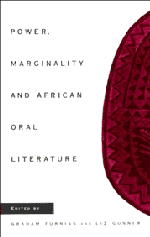Book contents
- Frontmatter
- Contents
- List of contributors
- Preface
- Note on transcription
- 1 Introduction: power, marginality and oral literature
- Part I Orality and the power of the state
- Part II Representing power relations
- Part III Oral forms and the dynamics of power
- 8 Power, marginality and Somali oral poetry: case studies in the dynamics of tradition
- 9 The function of oral art in the regulation of social power in Dyula society
- 10 The power of words and the relation between Hausa genres
- Part IV Endorsing or subverting the paradigms: women and oral forms
- Part V Mediators and communicative strategies
- Bibliography
- Index
9 - The function of oral art in the regulation of social power in Dyula society
Published online by Cambridge University Press: 18 December 2009
- Frontmatter
- Contents
- List of contributors
- Preface
- Note on transcription
- 1 Introduction: power, marginality and oral literature
- Part I Orality and the power of the state
- Part II Representing power relations
- Part III Oral forms and the dynamics of power
- 8 Power, marginality and Somali oral poetry: case studies in the dynamics of tradition
- 9 The function of oral art in the regulation of social power in Dyula society
- 10 The power of words and the relation between Hausa genres
- Part IV Endorsing or subverting the paradigms: women and oral forms
- Part V Mediators and communicative strategies
- Bibliography
- Index
Summary
In societies with an oral culture the social circulation of verbal genres is governed by precise rules stipulating which social units may produce them and which consume them. This etiquette is itself an expression of power relationships: certain groups produce genres which others are not allowed to perform; some groups enjoy the exclusive privilege of hearing speeches which others must perform for them. But these power relationships which are bound into the practice of oral art are not independent of other power relationships based upon moral, economic or political criteria.
On one level, power in the realm of institutional orality may seem to be merely consequent on other already-held social power, the former being nothing more than a distinctive sign of the latter (as it may be in the case of dress, for example). However, on another level, orality may also constitute itself an effective tool of power in that speech may have a direct effect through its performative or ideological functions.
In this chapter, I examine the range of relationships between social power and the practice of orality in Dyula society. The Dyula are an ethnic group based around Kong, a large village of 1,500 inhabitants in north-eastern Ivory Coast.
- Type
- Chapter
- Information
- Power, Marginality and African Oral Literature , pp. 122 - 129Publisher: Cambridge University PressPrint publication year: 1995
- 1
- Cited by



